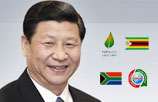Yearender: Abe's revisionism summons old ghosts to haunt Japan's future
(Xinhua) Updated: 2015-12-21 10:46Blurred lines
"What we're seeing here is a coordinated approach from multiple angles to revise history here, so as to grant Japan access to a global, militarized future without having to reflect, remember, recollect, recall or show remorse for any of its past wrongdoings," said political analyst Teruhisa Muramatsu.
He said this is the height of ultranationalism and perfectly in line with Abe's, his ministers' and numerous ruling party lawmakers' affiliation with the ultra-right Nippon Kaigi organization, which calls for Japan to fully return to its former imperialism.
Abe, at first, was subtle, then he hid in plain sight, now he's flaunting his revisionist, militaristic and imperialistic stance and in doing so mocking his detractors and the textbooks are all part of this, Muramatsu pointed out.
The Sept 18 Incident of 1931 (also known as the Manchurian Incident in Japan), a staged event designed by Japanese troops as a pretext for Japan's large-scale invasion of northeast China, is barely mentioned on one page.
The entire events in 1937 that predicated Japan's full-scale invasion of China are covered in a single page, and, sadly, the Nanjing Massacre, comfort women issue and even the atomic bombings of Hiroshima and Nagasaki are barely footnotes in these books.
Looking ahead, leading experts like Jeff Kingston, professor of Asian Studies at Temple University, believe that reconciliation with Japan's neighbors will continue to be a tricky task as long as Japan continues to prioritize a false sense of dignity based on soft-pedaling on history, over true empathy and remorse.
"Revisionists seek to restore the dignity of Japan by downplaying and denying past depredations that trample on the dignity and sensitivities of the two nations (China and South Korea) that suffered most from Japanese aggression and subjugation," Kingston said.
"This is counterproductive because it riles the neighbors and inflames the memory wars that sidetrack efforts to grapple with other pressing matters," he said.
Abe in his quest to fulfill his military-based legacy and that of his grandfather, a former prime minister and suspected war criminal, would do well to remember the words of Russian novelist Fyodor Dostoyevsky and in doing so, may realize the burden of responsibility he bears for a nation still perplexed as to why its old military machine has been fired up, said Muramatsu.
"'The man who lies to himself and listens to his own lie comes to a point that he cannot distinguish the truth within him, or around him, and so loses all respect for himself and for others'," he concluded.
- Abe's official website latest to come under possible Anonymous cyber attack
- Abe says no simultaneous parliamentary elections next summer, eyes electoral reform
- Chinese FM confirms Li, Abe's 'brief' talk in Malaysia
- China slams Shinzo Abe's 'groundless accusations'
- Park-Abe summit seen as chance to look to future






